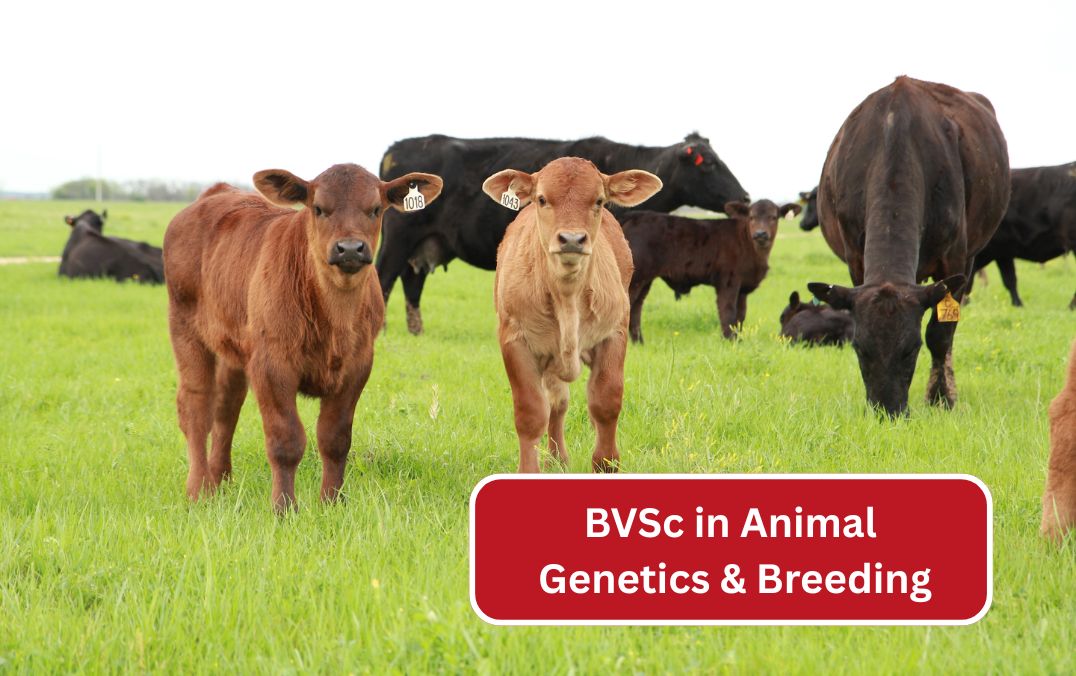If you’re passionate about animals and fascinated by how traits like milk production, disease resistance, or growth rate are passed down in livestock, a career in Animal Genetics and Breeding might be perfect for you. The Bachelor of Veterinary Science (BVSc) in Animal Genetics and Breeding is a five-year undergraduate program that blends veterinary science with the principles of genetics to improve livestock quality.
Let’s dive deeper into what this course offers, how to get in, and where it can take you.
What Is This Course About?
BVSc in Animal Genetics and Breeding is focused on studying:
- The science of heredity and variation in animals
- Genetic makeup of livestock and poultry
- Improving breeds through scientific breeding methods
- Topics like cytogenetics, cell biology, and molecular genetics
This course equips students to conduct research, analyze genes, and apply breeding strategies to enhance productivity and disease resistance in animals.
Eligibility Criteria
To apply for this program, you must:
- Complete Class 12 (10+2) from a recognized board
- Have studied Physics, Chemistry, and Biology (PCB)
- Score at least 50% in PCB subjects (relaxation for SC/ST/OBC categories)
- Be at least 17 years old at the time of the entrance exam
Admission Process
Admission to the BVSc Animal Genetics & Breeding course is usually entrance-based. Here’s how it works:
- Appear for Entrance Exams: Common ones include:
- NEET (National Eligibility cum Entrance Test)
- OUAT (Orissa University of Agriculture and Technology)
- RPVT (Rajasthan Pre-Veterinary Test)
- AAU VET (Assam Agricultural University)
- Merit List & Counselling: Based on your score, you’ll be invited for a counselling round conducted by the respective university.
- Final Admission: You get allotted a seat in the college based on your rank and preferences.
Course Structure & Duration
- Duration: 5 years (including 6 months to 1-year internship)
- Format: Semester-based examinations
- Internship: Mandatory final-year medical internship
Career Opportunities & Job Roles
After completing this degree, graduates can find employment in both the public and private sectors. Common job roles include:
- Animal Care and Service Worker
- Breeding Specialist or Geneticist
- Research Associate/Scientist
- Veterinary Officer or Private Practitioner
- Farm Manager (Poultry/Dairy)
- Veterinary Lecturer or Professor
- Pharmaceutical & Animal Nutrition Consultant
Salary Expectations
The salary range for BVSc Animal Genetics and Breeding graduates depends on experience, skills, and the employer. On average:
- Starting salary: ₹3 – ₹5 LPA (Lakhs per annum)
- With experience: Can go up to ₹10 – ₹12 LPA, especially in the private sector or research
Why Choose This Course?
Here’s why BVSc in Animal Genetics & Breeding is a valuable program:
- Helps boost livestock productivity through selective breeding
- Prepares professionals to work in animal welfare, agriculture, and biotech
- Offers fieldwork and research exposure, combining theory with practice
- Contributes to rural development by improving animal-based livelihoods
- Opens doors to higher studies (MVSc, PhD) and global career options
Quick Summary Table
| Feature | Details |
|---|---|
| Course Level | Undergraduate |
| Course Duration | 5 Years |
| Entrance Exams | NEET, OUAT, RPVT, AAU VET, etc. |
| Eligibility | 12th with PCB, Minimum 50% |
| Fees | ₹40,000 – ₹2 Lakhs per year |
| Internship | 6 months to 1 year (mandatory) |
| Starting Salary | ₹3 – ₹12 LPA |
| Job Roles | Geneticist, Researcher, Veterinary Officer, Lecturer, Farm Manager |
FAQs
Q1. Is NEET compulsory for BVSc Animal Genetics & Breeding?
Yes, most veterinary colleges require NEET scores for admission, though some state universities conduct their own entrance exams.
Q2. Can I start my own animal breeding business after this course?
Yes, with the right experience and licenses, you can run your own animal farm, dairy, or breeding unit.
Q3. Is there scope for research in this field?
Absolutely! Many graduates go on to do MVSc or PhD and work in genetic research, animal biotech, or government research projects.
Q4. What animals do you study in this course?
You study genetics and breeding of cattle, goats, sheep, poultry, horses, pigs, and sometimes exotic animals like rabbits and dogs.






